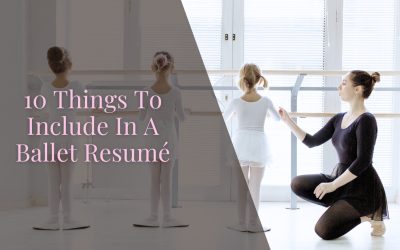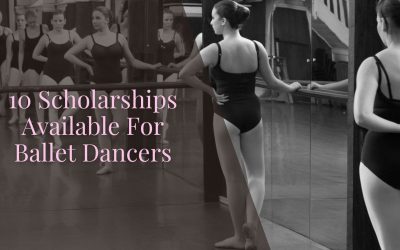
Attending a ballet audition can be an exhilarating yet nerve-wracking experience. Whether you are auditioning for a prestigious ballet school, a dance company, or a specific production, thorough preparation is key to showcasing your skills and making a lasting impression. This article provides comprehensive advice to help you navigate the audition process, from pre-audition preparation to post-audition follow-up.
Pre-Audition Preparation
1. Start Preparing Well In Advance
Successful auditions don’t happen by chance – they’re the result of thoughtful, consistent preparation. Ideally, start getting ready weeks or even months in advance. This gives you plenty of time to sharpen your technique, improve your stamina and build performance confidence without rushing. Work closely with your dance teacher or coach to identify areas for improvement. Whether it’s refining your turnout, improving musicality, or mastering performance presence, targeted practice makes a big difference. Consider scheduling a mock audition with your teachers or peers. Simulating the audition environment helps reduce nerves and gives you valuable feedback on what to refine. Early planning also gives you time to establish a strong wellness routine – prioritising rest, healthy meals, hydration and consistent training. All of these are key to performing at your best. Don’t forget the administrative side of audition prep. Put together a clean, professional résumé highlighting your training, performance experience and any awards. Include a recent headshot that clearly shows your face. If a video submission is part of the process, ensure it’s well-lit, high-quality and showcases your technique and artistry at their best. Always follow the application guidelines carefully – attention to detail counts.
2. Do Your Homework On The Organisation
Before the big day, take time to thoroughly research the school or company you’re auditioning for. Each has its own artistic vision, style and repertoire – so understanding what they value is key to standing out. Start by reviewing the audition requirements carefully. Know exactly what’s expected of you, including any specific repertoire to prepare, the dress code and whether you’ll need to submit additional materials like your dance résumé and headshots. Being well-prepared shows professionalism and attention to detail. Next, dig into the company or school’s background. Watch past performances, read interviews with directors and explore their signature works. Are they known for neoclassical precision or boundary-pushing contemporary ballet? Do they prioritise theatrical storytelling or athletic virtuosity? Use this insight to inform your audition choices. Select pieces that highlight your strengths while aligning with their aesthetic. If the organisation leans classical, showcase your clean lines and technique. If they embrace contemporary movement, choose something that reveals your versatility and expression. Showing that you’ve done your research – and can adapt to their style – demonstrates not just talent, but real commitment and artistic maturity.
3. Perfect Your Technique
In the weeks leading up to your audition, take the opportunity to sharpen your skills and build confidence. Extra ballet classes or private coaching sessions can be incredibly valuable, especially if they help you target areas needing improvement. Ask for feedback from your instructors and focus on the foundations: clean footwork, strong posture, precise turnout and controlled alignment. Set a consistent practice routine to develop stamina and reinforce muscle memory. Work on your transitions between movements – fluidity and control can elevate even the simplest combinations. And if you make a mistake? Keep dancing. Audition panels often value your ability to recover gracefully more than technical perfection. Beyond technique, remember that ballet is about storytelling. Use your breath, face and movement to express musicality and emotion. Even in a studio setting, perform as if you’re on stage. Show your love for dance – that spark is what truly captivates directors and makes your performance unforgettable.
4. Plan Your Outfit Carefully
What you wear to an audition speaks volumes before you even start dancing. Always follow any dress code provided – this usually means a clean, well-fitted leotard, tights and appropriate footwear such as ballet or pointe shoes. Your outfit should be neat, professional and allow the panel to clearly see your lines and technique. Stick to simple, solid colours and avoid bold patterns or flashy accessories that might distract from your dancing. Make sure your shoes are clean and in good condition and don’t forget the details – secure your hair in a tidy bun, be well-manicured and skip the jewellery. Looking polished helps you feel poised and professional. If you’re unsure about your outfit, do a dress rehearsal at home. This allows you to check for comfort, fit and functionality so you can step into the audition room feeling confident, composed and completely focused on your performance.
Mental and Physical Preparation
5. Focus On Your Mental Game
It’s natural to feel nervous before an audition but maintaining a calm and focused mindset can make all the difference. In the days leading up to it, incorporate breathing exercises, visualisation or light meditation into your routine to steady your thoughts and calm your nerves. Visualisation is a powerful tool used by athletes and performers alike. Picture yourself stepping confidently into the room, moving through each combination with ease and expressing your artistry with confidence. Mentally rehearsing your performance this way can help reduce anxiety and boost self-assurance. Positive affirmations can also work wonders – remind yourself of your strengths, the progress you’ve made and the dedication you bring to your art. And most importantly, avoid comparing yourself to others. Every dancer’s path is unique and auditions are about presenting your own best version – not someone else’s.
6. Prepare Physically
In the days leading up to your audition make sure to prioritise rest, hydration and balanced nutrition to ensure you’re physically and mentally at your peak. Aim for consistent, quality sleep in the days before and make sure you’re drinking plenty of water to stay hydrated. On audition day, fuel your body with a nourishing meal and bring healthy snacks and a water bottle with you – just in case there’s a long wait. Arrive with enough time to fully warm up without rushing. A proper warm-up helps activate your muscles, prevents injury and gets you mentally in the zone. Focus on gentle cardio, dynamic stretches and ballet-specific movements that help you feel centred and strong. Treat your warm-up like the first act of your performance – it sets the tone for everything that follows.
At The Audition
7. Be Polite, Punctual And Professional
Arrive at the audition venue well in advance to allow time for check-in and warm-up. Follow the check-in process as instructed. Be polite and professional with the staff and other dancers. Arriving early also helps reduce stress and gives you time to acclimate to the environment. Auditions are about more than just dancing – they’re also an opportunity to show you’re someone who will be a pleasure to work with. Arrive early, check in politely and follow all instructions carefully. Smile and greet others warmly; kindness and professionalism are always appreciated. Listen closely when corrections are given, even if they’re not directed at you. Showing that you’re a respectful and teachable dancer can really work in your favour. Sometimes, directors are watching even when you’re not dancing. Interact with the judges politely and respectfully. Thank them for the opportunity and respond to any questions or feedback graciously. Exude confidence and expressiveness in your movements. Smile, maintain eye contact with the judges, and convey your passion for dance.
8. Stay Flexible – Things Might Not Go As Expected
No matter how prepared you are, things might not go according to plan. The schedule might change, the floor might feel strange, or you might get a combination you’ve never done before. Flexibility and adaptability are key traits that audition panels appreciate. If something unexpected happens, don’t panic. Breathe, adjust, and keep dancing. Showing that you can stay calm and focused in a stressful moment is incredibly valuable in a performer. Maintain focus throughout the audition. Listen carefully to instructions and apply corrections promptly. Be adaptable and willing to adjust to any changes or unexpected challenges during the audition. This demonstrates your professionalism and versatility.
Following The Audition
9. Reflect And Learn From The Experience
Once the audition is over, take a moment to breathe – and then reflect. What went well? What would you do differently next time? Each audition, no matter the result, is a valuable learning opportunity. Consider keeping a journal of your audition experiences where you can jot down your thoughts, track your progress and notice patterns in your development. Be kind to yourself during this process. Auditioning takes courage and simply showing up is a big win. Acknowledge your effort and celebrate the small victories, whether it’s a clean pirouette, a confident smile, or keeping your composure under pressure. It’s also a lovely gesture to send a thank-you note or email to the audition panel or organisation. A brief, gracious message expressing your appreciation for the opportunity and sharing what you enjoyed about the experience can leave a lasting, positive impression.
Dealing With Outcomes
10. Accepting The Outcome
Stay informed about the results of the audition, making sure to follow any instructions provided regarding the timeline for notifications. If you are accepted, celebrate your achievement and prepare for the next steps. Familiarise yourself with the expectations and requirements of the program or company. Ensure a smooth transition by organising your schedule, securing accommodation if necessary and addressing any logistical considerations. If you are not accepted, stay positive and use the experience as a learning opportunity. Rejection is common for anyone pursuing a career in the creative arts and it does not define your worth or potential – it’s an opportunity for continuous improvement and to find the space where you truly belong. If possible, seek feedback from the audition panel or instructors as constructive feedback is invaluable for your development as a dancer. You can also seek feedback from mentors, instructors and peers. Continue your training and education in ballet – attend workshops, masterclasses and performances to stay inspired and motivated. Set new goals and plan for future auditions, using the feedback and experiences from this audition to refine your preparation for the next opportunity.
Final Thoughts
Auditions can be intimidating, but they’re also an exciting chance to showcase your talent, passion and potential. Attending a ballet audition is a multifaceted process that requires meticulous preparation, mental resilience and a positive attitude. By researching the organisation, polishing your technique and preparing both mentally and physically, you can present yourself confidently and professionally. Regardless of the outcome, each audition is a valuable learning experience that contributes to your growth as a dancer. Embrace the journey, stay dedicated to your craft and whatever the outcome, continue to pursue your passion for ballet with passion and determination.
You Might Also Like…
10 Things To Include In A Ballet Resumé
Crafting a ballet resumé is a unique art form in itself. It's more than just a list of experiences, it's your chance to showcase your training, talent and professionalism in a concise, polished format. Whether you're auditioning for a company, a summer intensive, or...
10 Scholarships Available For Ballet Dancers
Ballet is a beautiful, demanding art form—and it often comes with a hefty price tag. From tuition fees and pointe shoes to travel costs for auditions and performances, pursuing ballet at a high level requires serious financial investment. But don't let money hold you...
The Top 20 Touring Ballet Companies
Here is a list of the top 20 touring ballet companies in the world, renowned for their excellence in performance and extensive touring schedules: Bolshoi Ballet Location: Moscow, Russia Description: One of the oldest and most prestigious ballet companies in the world,...



